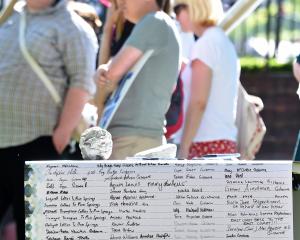
The Student Academic Misconduct report presented to the university council this week revealed that of the 79 findings of academic misconduct in 2023, 24 were for unauthorised use of generative artificial intelligence (GenAI).
In November 2022, ChatGPT was released online as a free large language model text generation tool.
Subsequently, staff and students became more aware of the range of GenAI tools freely available for use.
The report said the university implemented the Australasian academic integrity network guidelines for using GenAI in teaching and learning, which left individual teachers with the responsibility of determining, and making explicit, if or how students in their classes could use GenAI for their assessments.
Prof Robin Gauld, who teaches both at the Dunedin School of Medicine and the Otago Business School, said most students were not fully aware of AI’s benefits and problems.
"It doesn’t surprise me at all there were so many incidents of misconduct using AI.
"It’s really easy to find things and put them into essays — a student who uses AI not very cleverly is pretty easy to pick up. Often AI gives facts, but doesn’t properly reference things or gives references that are made up," he said.
"Our advice is to use it carefully, cite material, and not just cut and paste things. Use it as an information source, not as main material.
"I think a lot of students are using it to summarise academic papers. They’ll take the paper and use the AI for a simple explanation.
"But I don’t know whether AI use is ubiquitous yet ... I still don’t know whether most students are aware of the power and the limits of it."
Students should have the opportunity to use AI "responsibly and ethically", he said.
"I personally think we should be embracing AI."
The misconduct report said the types of offences committed included plagiarism in submitted assignments, submitting assignments directly copied from those of other students, submitting assignments containing inadequately referenced material, copying other students in class tests and being in possession of unauthorised material in final examinations.
The report also summarised all academic misconduct by division from 2019 to last year.
It said there were 85 misconduct findings in 2019, 82 in 2020, a spike to 118 in 2021, before dropping back to 87 in 2022.
The acting vice-chancellor’s disciplinary report also revealed some extraordinary cases of academic ill-discipline last year.
These included a division of sciences students found to have committed level 3 academic misconduct by plagiarising text.
It was their fifth academic misconduct incident over two years. The student was excluded for a minimum period of five years.
A postgraduate humanities division student who committed plagiarism when submitting their dissertation was found to have committed level 3 academic misconduct, following four earlier instances of academic misconduct.
The student was permanently excluded from the university.











